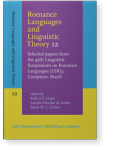Chapter 7
Recursion in Brazilian Portuguese complex compounds
This paper reports on a preliminary production experiment in order to argue that word-word compounds with a left or right prosodic adjunct in Brazilian Portuguese (e.g.,
porta-guarda-chuva ‘umbrella holder’, lit. holder keep rain, and mico-leão-dourado
‘golden-lion-tamarin’, lit. tamarin lion golden, in which the adjunct is in bold) are prosodized recursively. It assumes that word-word compounds in BP correspond to composite groups, the prosodic domain between the phonological word and the phonological phrase proposed by Vogel (2008, 2009), based on the observation that word-word compounds display phonological behaviour that is distinct from the behaviour of both regular words (i.e., non-compounds) and other composite structures in the language. The preliminary experiment involved the production of sentences containing complex compounds with left adjunction, complex compounds with right adjunction, coordinate compounds and coordinate phrases by native speakers of BP (n = 3). The results indicate that compounds with adjunction have specific acoustic profiles, which differ from the acoustic profile of both coordinate compounds and phrases. The analysis supports both prosodic recursion and the introduction of an additional prosodic domain, two views on prosodic configuration that are traditionally considered to be mutually exclusive.
Article outline
- 1.Introduction: The place of compounds in Prosodic Phonology
- 2.The prosodic representation of word-word compounds in Brazilian Portuguese
- 3.Complex compounds and prosodic adjunction
- 3.1Compounds with adjunction vs. coordinate compounds
- 3.2The representation of complex compounds
- 4.Final remarks
-
Notes
-
References
